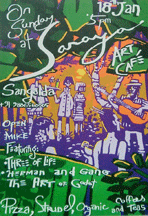Rai. Mustard seeds are produced from three different plants of cabbage family. An important culinary spice in Indian cooking, mustard can be used in the form of whole seeds in curries or as a powder in pickles. It imparts a mildly hot and pungent flavor to the dish.
Mustard seeds of the various mustard plants are among the smallest of seeds. The seeds are about 3mm in diameter, and may be colored from yellowish white to black. They are important spices in many regional cuisines. The seeds can come from three different plants: black mustard (Brassica nigra), brown Indian mustard (B. juncea), and white mustard (B. hirta/Sinapis alba).
Indians have used mustard seeds in their food for over two thousand years. he French have used mustard seeds as a spice since 800 AD, and it was amongst spices taken by the Spanish on explorations throughout the fifteenth century.
Gautama Buddha told the story of the grieving mother (Kisa Gotami) and the mustard seed. When a mother loses her only son, she takes his body to the Buddha to find a cure. The Buddha asks her to bring a handful of mustard seeds from a family that has never lost a child, husband, parent or friend. When the mother is unable to find such a house in her village, she realizes that death is common to all, and she cannot be selfish in her grief.
In the Quran, Allah states that the scales of justice will be established on the Day of Judgment, and no soul will suffer the least injustice. Even the equivalent of a mustard seed will be accounted for because God is the most efficient reckoner.
In the Christian New Testament, the mustard seed is used by Jesus as a model for the kingdom of God which initially starts small but grows to be the biggest of all garden plants. Faith is also spoken about in the context of a mustard seed.
Aavakaaya in Telugu:, Sasive in Kannada: is a variety of Indian pickle consisting mainly of mangoes, red chilli powder and aavaa pindi (powdered mustard) preserved in Mustard oil is popular in South India with its origin in Andhra Pradesh.
These Mustard seeds are also known as "Sarson" and is very popular in North India. In North sarson ka Saag is very popular.
"sarson ka tel" Mustard oil is very good for body massage during extreme winters, as it keeps the body warm and moist.
Mustard Seed's hot and spicy flavor enhances meats, fish, fowl, sauces, and salad dressings. Powdered Mustard has no aroma when dry, but a hot flavor is released when it is mixed with water. Before using, mix Mustard Powder with water to form a paste. It takes about 10 minutes for the mustard flavor to develop. Use in foods needing flavor highlights. Unlike other pungent spices, Mustard's flavor does not build or persist. Mustard helps emulsify liquids use in salad dressing recipes to help blend oil and vinegar and add a spicy zip. Mustard Seed has long been relied upon to improve the digestive system and to promote a healthy appetite. As an irritant, Mustard stimulates the gastric mucous membrane and increases the flow of gastric juices (also having some effect on pancreatic secretions), all of which help to advance good digestion. Herbalists have also used Mustard Seed to relieve obstinate hiccups.
The mucilage content in Mustard Seed may help to calm an upset stomach due to acid indigestion and also produces a laxative action.
Mustard Seed is a stimulant that warms and invigorates the circulatory system, encourages blood flow, and is also said to aid in the metabolism of fat in the body. It is also considered a diaphoretic, an agent that helps to increase perspiration, which can lower fever and cleanse toxins from the body through the skin. This factor is also useful for colds and flu.
Mustard seeds are the small round seeds of various mustard plants. The seeds are usually about 1 or 2 mm in diameter. Mustard seeds may be colored from yellowish white to black. They are important spices in many regional foods. The seeds can come from three different plants: black mustard (Brassica nigra), brown Indian mustard (B. juncea), and white mustard (B. hirta/Sinapis alba).
One of the oldest uses of Mustard Seed has been as an emetic, a medicine that provokes vomiting. This is especially valuable when used in narcotic poisoning when it is desirable to empty the stomach without the accompanying depletion and depression of the system.
Used externally, Mustard Seeds are famous for their rubefacient properties by dilating the blood vessels and increasing the blood flow toward the surface of the skin, warming and reddening the affected area and encouraging the removal of toxins. Poultices and Mustard plasters are a tried-and-true remedy to relieve the pain of arthritic joints, rheumatism, sciatica, neuralgia, neck pain, backache, "charley horse," and muscle pain.
Mustard Seed's topical use also extends to the relief of respiratory infections when used in baths, poultices, and plasters. Mustard Seed helps treat bronchitis, chest congestion, pneumonia, croup, and pleurisy.
Mustard is a rich source of many health benefiting minerals. Calcium, manganese, copper, iron, selenium and zinc are some of the minerals especially concentrated in these seeds. Calcium helps build bone and teeth. Manganese is used by the body as a co-factor for the antioxidant enzyme superoxide dismutase. Copper is required in the production of red blood cells. Iron is required for the red blood cell formation and cellular metabolism.
Mustards are used extensively in Indian, Pakistani, Bangladesh, Mediterranean and German cooking. Whole seeds, ground or powdered form, prepared pastes, sauces and oil are all used in cooking.
The aroma and pungent flavor of mustard comes from the essential oils sinalbin which releases isothiocyanate upon enzymatic reaction by myrosinase.
| < Prev | Next > |
|---|
















